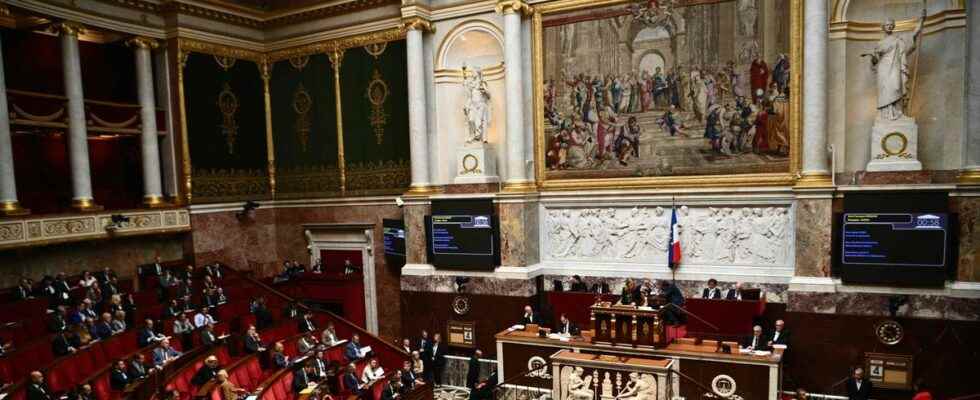These two changes proposed by the executive aim to limit the “unacceptable” income of energy companies, Bruno Le Maire justified himself on Tuesday.
The government outlines its plans to oppose the “annuities“that energy companies are pocketing with soaring prices, without going so far as to set up a tax on”superprofits“, desired by the left. Tabled last Friday by the executive, two amendments to the 2023 budget aim to implement the European decision, announced two weeks ago, to claw back some of the profits of energy giants and cap revenues from high electricity prices .
First, the First Amendment states that the “temporary solidarity contributionvalidated by the European Union, which will cover the 2022-2023 financial year, will apply to the results of companies that generate at least 75% of their turnover in the “extraction, mining, petroleum refining or coke oven product manufacturing sectors“. The contribution base is calculated by taking the difference between “the taxable profit determined pursuant to the rules of domestic law for the first fiscal year beginning on or after January 1, 2022 and 120% of the average amount of taxable earnings determined pursuant to the rules of domestic law recorded for all previous fiscal years, opened from January 1, 2018“. The contribution rate, meanwhile, is set at 33%. In other words, the idea is to recover a third of the profits exceeding the average of the previous four years by 20%.
Read alsoSuperprofits: Bercy plans to recover 26 billion euros
This amendment does notrelates only to oil, gas, coal producers or refiners“Explained the Minister of Economy and Finance, on France Info, Tuesday. In France, only the last will be concerned, and the contribution should bring in only 200 million euros in the coffers of the State. “Not much“, according to Bruno Le Maire.
SEE ALSO – Inflation: Terminal “does not close the door” to a taxation of the “super profits” of companies
Taxing the “annuity” of electricity producers
Then, the second amendment comes, here again, to transcribe a European decision into tricolor law: the establishment of the “mechanism for capping inframarginal revenues from electricity production“. At the end of September, the Member States had in fact decided to cap the income of electricity producers, considering that they are taking full advantage of the soaring prices which penalize households. In accordance with its commitments, the executive therefore wants to establish a limit, from December 1 to June 30, 2023, by capping “income from electricity production at €180/MWh“. A means of leaving investment margins for producers, while limiting their income to a reasonable level. Producers will obviously be able to charge their customers a price for electricity well above these 180 euros, but income beyond this ceiling will therefore be recovered by the State.
“The cap is not complete, a reduction of 10% being provided so as not to completely suppress any economic signal“, specifies the statement of the reasons for the amendment. All electricity generation technologies are concerned, but the threshold may be adapted according to them. Are also excluded from the calculationrevenues from electricity production which are already capped due to public measureslike the Arenh, the document says.
This modification should allow the State to redistribute to the French “the whole“profits beyond the ceiling, welcomed Bruno Le Maire, who hopes to make 26 billion euros, a sum “considerable» making it possible to finance more than half of the energy shield. “I don’t want there to be energy companies who can take advantage of the situation, sell electricity at a gold price“, also hammered the minister.
SEE ALSO – Energy: The Mayor against profit “unduly from an annuity linked to crazy prices”
Alternative proposals
The taxation of profits generated by the energy giants has been agitating the National Assembly for many months. This summer, a text aimed at setting up a “exceptional tax of 25% on superprofitsfrom oil and gas companies, shipping companies or highway concessionaires was narrowly dismissed.
More recently, the Nupes presented a proposal for a referendum of shared initiative (RIP) in order to create “an additional contribution on the exceptional profits of large companies“. Objective: to tax until the end of 2025 companies with a turnover of more than 750 million euros, “when the company’s taxable income for the financial year in question for the aforementioned corporation tax is greater than or equal to 1.25 times the average of its taxable income for the financial years 2017, 2018 and 2019“. This track was dismissed out of hand by the executive. “It is not an exceptional tax on profits, but permanent“, quipped Bruno Le Maire, Tuesday. “Basically, what Nupes does not want is for companies to be profitable“, he denounced.
Read alsoFor Emmanuel Macron, a budget under high tension
Started on October 10, the first reading examination of the 2023 budget could last ten days, if the more than 3,000 amendments tabled can be examined in time. The executive should however use article 49-3 of the Constitution, in order to ensure the passage of this flagship text, despite strong opposition.
